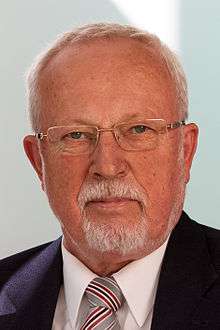Lothar de Maizière
Lothar de Maizière (German pronunciation: [də mɛˈzi̯ɛːɐ̯]; born 2 March 1940)[1] is a German Christian Democratic politician. In 1990, he served as the only democratically elected prime minister of the German Democratic Republic, and as such was the last leader of an independent East Germany.
Lothar de Maizière | |
|---|---|
 | |
| Prime Minister of the German Democratic Republic (East Germany) | |
| In office 12 April 1990 – 2 October 1990 | |
| President | Sabine Bergmann-Pohl |
| Preceded by | Hans Modrow |
| Succeeded by | Helmut Kohl (as Chancellor of Germany) |
| Deputy Chairman of the Council of Ministers | |
| In office 18 November 1989 – 12 April 1990 | |
| President | Egon Krenz Manfred Gerlach Sabine Bergmann-Pohl |
| Prime Minister | Hans Modrow |
| Preceded by | Günther Kleiber Alfred Neumann |
| Succeeded by | Klaus Reichenbach |
| Federal Minister of Special Affairs | |
| In office 3 October 1990 – 17 December 1990 | |
| President | Richard von Weizsäcker |
| Chancellor | Helmut Kohl |
| Preceded by | Hans Klein |
| Succeeded by | Friedrich Bohl |
| Personal details | |
| Born | 2 March 1940 Nordhausen, Province of Saxony, Prussia, Germany |
| Nationality | German |
| Political party | East German Christian Democratic West German Christian Democratic |
| Profession | Musician, lawyer, politician |
| Signature | |
Family background
De Maizière belongs to a noble family originally from Maizières-lès-Metz who, as Huguenots, fled France for asylum in Prussia in the late 17th century;[2][1] the Maizière family attended French-language schools and Huguenot churches in Berlin until the beginning of the 20th century. He is a son of the lawyer Clement de Maizière. His uncle Ulrich de Maizière was Inspector General of the Bundeswehr (the West German Armed Forces). His cousin Thomas de Maizière is a close advisor to Chancellor Angela Merkel and served as the Federal Minister of the Interior from 17 December 2013 to 14 March 2018 in Merkel's third cabinet.
Early life and education
Lothar de Maizière was born in Nordhausen, Thuringia, and attended the ancient Berlinisches Gymnasium zum Grauen Kloster,[3] where he was one of the last pupils before the school closed in 1958. He next studied viola at the Hanns Eisler College of Music in East Berlin from 1959 to 1965.[4] He played in the Berlin Symphony Orchestra[5] before going on to study law (by distance learning, through the Humboldt-Universität zu Berlin) from 1969 to 1975.[6]
Career
A longtime member of the East German Christian Democratic Union, de Maizière helped oust the party's pro-Communist leadership after the fall of the Berlin Wall. He was elected the party's chairman in November.[6] In the first—and as it turned out, only—free election held in East Germany, de Maizière was elected to the Volkskammer. One month later, he succeeded Hans Modrow as Premier[7] and held this position from 12 April until 2 October 1990, heading the de Maizière cabinet.[8] He ran on a platform of speedy reunification with the Federal Republic of Germany (from 1949 to 1990, West Germany). As premier, de Maizière signed the Treaty on the Final Settlement with Respect to Germany (the so-called "Two Plus Four Treaty"),[9][10] which ended the four wartime allied powers' rights and responsibilities in Berlin and Germany, and which preceded German reunification. The treaty provided that it would be signed by the four allies and the two Germanies but ratified only by newly reunified Germany and the allies. In accordance with that treaty, East Germany ceased to exist on 3 October, and its territory was annexed by the Federal Republic.
After German reunification, he was appointed Minister for Special Affairs in the CDU government of chancellor Helmut Kohl, until his resignation on 17 December 1990 amid rumours that he had worked for the East German Stasi (Stasi name: IM Czerni[11]).[12]
References
- "Lothar de Maizière, Geschichte der CDU, Konrad-Adenauer-Stiftung". kas.de. Retrieved 2 February 2017.
- Dempsey, Judy (2 March 2011). "Merkel is Quick to Fill Open Cabinet Position". The New York Times. Retrieved 9 July 2015.
- "Evangelisches Gymnasium zum Grauen Kloster". www.graues-kloster.de. Retrieved 7 February 2017.
- "Who is Lothar de Maiziere?". 22 November 2011.
- "Lothar de Mazière". www.bakuforum2016.com. Archived from the original on 5 August 2017. Retrieved 7 February 2017.
- Derek Lewis & Ulrike Zitzlsperger, Historical Dictionary of Contemporary Germany, Rowman & Littlefield, 18 Oct 2016 p.412
- Quint, Peter E. (2012). The Imperfect Union: Constitutional Structures of German Unification. Princeton University Press. p. 42.
- "Address given by Lothar de Maizière on the eve of German unity (Berlin, 2 October 1990)". cvce.eu. 25 October 2012.
- "Treaty on the Final Settlement with Respect to Germany - Making the History of 1989". www.chnm.gmu.edu. Archived from the original on 7 May 2019. Retrieved 7 February 2017.
- "Resources for The Treaty on the Final Settlement with respect to Germany - Subject files - CVCE Website". www.cvce.eu. Retrieved 7 February 2017.
- https://www.zeit.de/1992/05/neues-von-czerni
- "Biography: Lothar de Maizière - Biographies - Chronik der Wende". www.chronikderwende.de. Retrieved 7 February 2017.
External links

| Political offices | ||
|---|---|---|
| Preceded by Hans Modrow |
Chairman of the Council of Ministers of
the German Democratic Republic 1990 |
Succeeded by Helmut Kohl as Chancellor of United Germany |